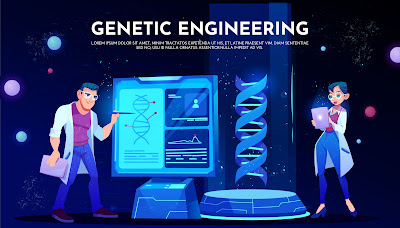Biotechnology and genetic engineering are rapidly advancing fields that have the potential to revolutionize healthcare, agriculture, and industry. These technologies have already produced a number of important breakthroughs, from new cancer treatments to drought-resistant crops. However, they also raise a number of ethical and safety concerns. In this blog, we will explore some of the recent advances and concerns in biotechnology and genetic engineering.
 |
| Genetic Engineering |
Advances in Biotechnology and Genetic Engineering:
Gene Editing:
Gene editing allows scientists to make precise changes to the DNA of living organisms, including humans. This has the potential to cure genetic diseases, such as sickle cell anemia and Huntington's disease, and to develop new treatments for cancer and other diseases.Synthetic Biology:
Synthetic biology involves designing and constructing new biological systems or modifying existing ones. This has led to the development of new materials, such as biodegradable plastics, and new energy sources, such as biofuels.Agricultural Biotechnology:
Agricultural biotechnology has led to the development of crops that are more resistant to pests and diseases, as well as crops that require fewer pesticides and herbicides. This has the potential to increase crop yields and reduce the environmental impact of agriculture.
Concerns in Biotechnology and Genetic Engineering:
Ethical Concerns:
Gene editing raises a number of ethical concerns, such as the potential for unintended consequences and the possibility of creating "designer babies" with desirable traits. There are also concerns about who will have access to these technologies and who will be left behind.Environmental Concerns:
Biotechnology and genetic engineering can have unintended environmental consequences, such as the creation of invasive species or the transfer of genes from genetically modified crops to wild relatives.Safety Concerns:
There are also safety concerns related to biotechnology and genetic engineering. For example, the release of genetically modified organisms into the environment could have unintended consequences, such as the spread of antibiotic resistance genes.





0 Comments
Do not write a span or hateful message.